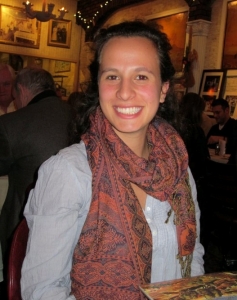 Human development major Helena Herman '11, spent this past summer examining the links between extension systems and translational research initiatives in the US. Under the guidance of Elaine Wethington, Associate Professor of Human Development and Co-Director of the Bronfenbrenner Life Course Center, Herman researched existing translational research and community-based participatory research initiatives throughout the country and looked at their relationships to cooperative extension.
Human development major Helena Herman '11, spent this past summer examining the links between extension systems and translational research initiatives in the US. Under the guidance of Elaine Wethington, Associate Professor of Human Development and Co-Director of the Bronfenbrenner Life Course Center, Herman researched existing translational research and community-based participatory research initiatives throughout the country and looked at their relationships to cooperative extension.
“I was interested in understanding how community engagement might influence the effectiveness and efficiency of translational research,” says Herman.
In keeping with her boundless enthusiasm for the topic, the goals of her project were ambitious. She set out to assess and compare all current translational research initiatives in the country; to examine any collaborative partnerships between translational research initiatives and state extension systems; to understand factors contributing to such collaboration; and to predict the potential for partnerships among non-collaborating initiatives and their respective state extension systems.
As part of the project, she undertook an extensive literature review of translational research and community based participatory research (CBPR), looking at factors important for bringing translational research to communities. She summarized major contributions and conclusions from over 100 articles. She also noted definitions of community-based participatory research and translational research throughout in order to extrapolate key words for each nuanced definition of community-based participatory research and translational research.
“Given the wide spectrum of definitions used for translational research and CBPR, a more unified taxonomy would be extremely useful,” commented Herman.
She synthesized her findings in a paper outlining CBPR methodology and highlighting the contributions of CBPR to research translation. But, she didn’t’ stop there! She went on to catalog all Cooperative Extension offices and translational research initiatives in the country. It turns out that there are one hundred thirty five centers committed to translational research in the US, including both federally- and non- federally- funded initiatives.
“This census provides an overview of what is currently being done in the field of translational research. It has proven useful to researchers in the College as they consider strategies for strengthening Cornell’s role in bringing translational research to communities in New York,” says Herman.
She found only twelve translational research initiatives (representing 10 states) maintain some sort of collaborative partnership with a state extension system and only two states demonstrated more seamlessly integrated extension and translational initiatives (Kentucky and New Mexico).
Herman created a poster detailing her findings and analyses and presented it at a reception at the Cornell Cooperative Extension Leadership Conference in October 2010. She is currently pursuing an independent study, under Elaine Wethington, to further explore the role of cooperative extension in translational research.

